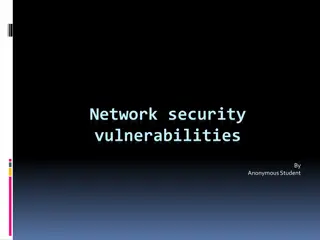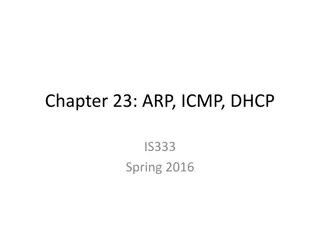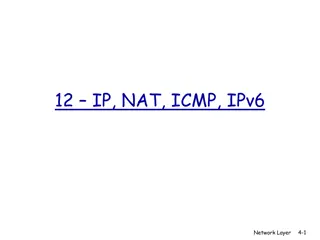Hands-On Snort Testing and Rule Creation for Infrastructure Security
Dive into the world of Snort, a powerful intrusion detection system, through a practical course project in infrastructure security. This project, part of SEC290 Fundamentals of Infrastructure Security, focuses on testing Snort rules by capturing XMAS and TCP packets, as well as creating rules to det
0 views • 6 slides
Comprehensive Guide to Hacking Techniques & Intrusion Detection
Dive into the world of hacking techniques, intrusion detection, and network protocols with expert Ali Al-Shemery. Learn about host discovery, port scanning, packet crafting, and more using tools like Nmap. Explore the importance of network protocols like TCP, UDP, ICMP, and ARP. Discover the art of
0 views • 50 slides
Understanding Network Security Vulnerabilities and Attacks
Explore the world of network security vulnerabilities and attacks, including Denial-of-Service (DoS) and Distributed-Denial-of-Service (D-DoS), security flaws in the TCP/IP protocol suite, ICMP attacks, routing attacks, and TCP attacks. Learn about common security vulnerabilities such as address spo
0 views • 36 slides
Simplified Router Implementation for CSC458/2209 Course
You will be designing a simplified router for CSC458/2209 course with specific functionalities such as handling Ethernet frames, ICMP messages, ARP requests, IP packets, and more. The router will operate in an emulated network environment using Mininet and will need to route traffic between a client
0 views • 16 slides
Understanding ARP, ICMP, and DHCP in TCP/IP Protocol Stack
ARP (Address Resolution Protocol) plays a crucial role in bridging the Layer 2/Layer 3 addressing boundary in the TCP/IP protocol stack, allowing IP to be agnostic about layer 2 addressing while still using layer 2 for packet delivery. Machines ARP for MAC addresses within their local network, where
0 views • 39 slides
Understanding IP Networking Fundamentals
Dive into the world of network layer protocols with a focus on IP, NAT, ICMP, and IPv6. Explore concepts like fragmentation, reassembly, datagram formats, addressing, and subnets, essential for grasping how data is transmitted across networks efficiently and securely.
0 views • 28 slides





